AFRICA, Business, FEATURED STORIES, news, TRENDING
SPECIAL REPORT: The ‘Seven Wonders’ Of Dangote Refinery, Africa’s Biggest Oil Revolution
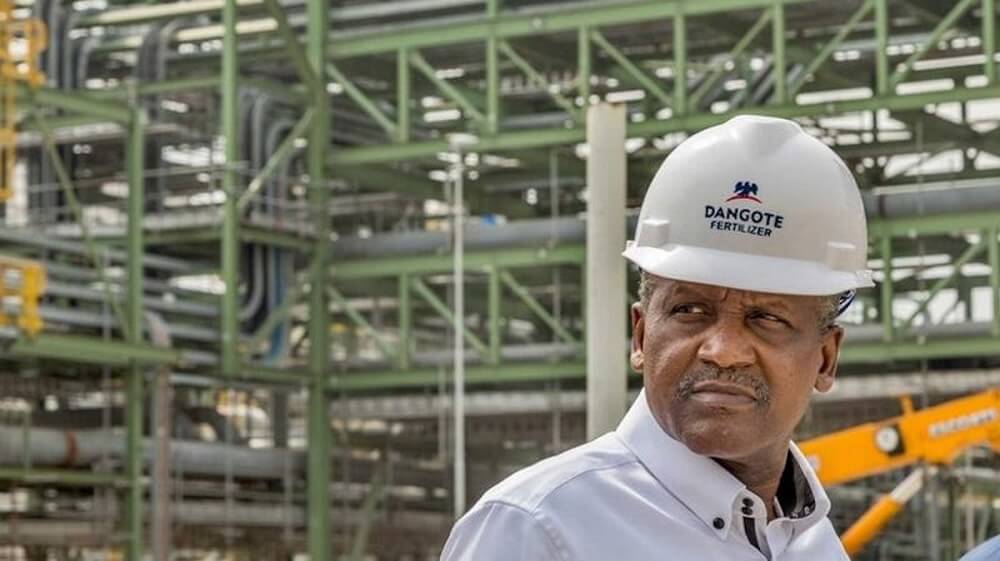
Like an inevitable hurricane, Dangote Petroleum Refinery – the brainchild of Africa’s richest man, Aliko Dangote – swept into the Nigerian oil and gas industry, bringing with it a revolution which will impart the whole of African demand and supply chain, a significant shift towards a self-sufficiency model.
Barely two weeks into the New Year, the Dangote Petroleum Refinery stamped its feet in the murky history of oil and gas in Nigeria when it announced that it had commenced the production of diesel and aviation fuel in Lagos.
With the two products, the test run began; and what remains; the refinery would soon unveil one of its largest strengths – the production of Petroleum Motor Spirit, otherwise known as petrol.
The Refinery had earlier received its fourth shipment of one million barrels of bonny light crude oil, supplied by the Nigeria National Petroleum Corporation Limited (NNPCL) and the facility had got six million barrels of crude to start operation as the world’s largest single-train refinery.
An obviously elated chairman of the Dangote Group, Aliko Dangote, had thanked President Bola Tinubu for his support and encouragement, “towards the actualisation of this project.”
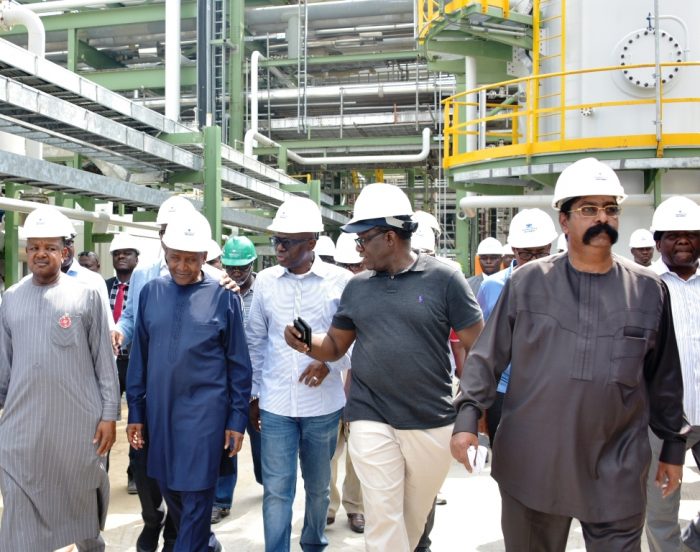
He had also thanked the Nigerian National Petroleum Company Limited, the Nigerian Upstream Petroleum Regulatory Commission, Nigerian Midstream and Downstream Petroleum Regulatory Authority and Nigerians for their support and belief in what he called the historic project.
“We thank President Bola Tinubu for his support and for making our dream come true. This production, as witnessed today, would not have been possible without his visionary leadership and prompt attention to details.
“This is a big day for Nigeria. We are delighted to have reached this significant milestone. This is an important achievement for our country as it demonstrates our ability to develop and deliver large capital projects. This is a game changer for our country,” Dangote declared.
The statement posted on the Dangote Group X handle added that the Dangote Refinery “can load 2,900 trucks a day at its truck-loading gantries.
“The products from the Refinery will conform to Euro V specifications. The refinery design complies with the World Bank, US EPA, European emission norms, and DPR emission/effluent norms.”
It was earlier reported that the Dangote Petroleum Refinery was set to start producing Automotive Gas Oil, also known as diesel, and JetA1 or aviation fuel, in January 2024, while the production of petrol was being delayed by the supply of crude oil in instalments.
Caracal Reports Nigeria in this expansive report takes a look at the “seven wonders” which the Dangote Petroleum Refinery has unveiled to Nigeria and indeed Africa, and how this is revolutionising the Oil and gas global space.
Dangote Refinery – An unapologetic, daring beginning
The Dangote Petroleum Refinery and Petrochemical Project, a subsidiary of Dangote Industries Limited, is a 650,000 barrels per day crude oil refinery located in Dangote Industries Free Zone, Ibeju-Lekki, Lagos, Nigeria.
Caracal Reports Nigeria takes a visit to the Dangote Petroleum Refinery in Ibeju-Lekki, which has the capacity to refine 650,000 barrels of crude oil per day, and covers an area of approximately 2,635 hectares in the Lekki Free Trade Zone in Lagos.
The facility, built from scratch on reclaimed swampland, aims to end Nigeria’s reliance on fuel imports.
Owned by Africa’s richest man Aliko Dangote, the $20billion refinery received its first crude shipment in December 2023. Last week it got a sixth cargo, allowing initial production of diesel and aviation fuel to commence.
Akin Omole, managing director of Dangote Ports Operations, said the receipt of six million barrels of crude would facilitate the initial run of the refinery and begin the production of diesel, aviation fuel, and liquefied petroleum gas.
According to Omole, the production of premium motor spirit will start later.
Meeting all of Nigeria’s domestic fuel needs, the refinery can also export surpluses. Its premium gasoline production starts later, reaching full capacity by 2025.
Repeated construction delays pushed back its completion date from 2019 to late 2022. The Covid-19 pandemic and intricate plant infrastructure like a 435 megawatt power station caused holdups.
After starting mechanical operations, the refinery will scale up to its full capacity. Loading 2,900 fuel trucks daily, it is projected to produce 10.4 million metric tons of gasoline and 4.6 million tons of diesel annually.
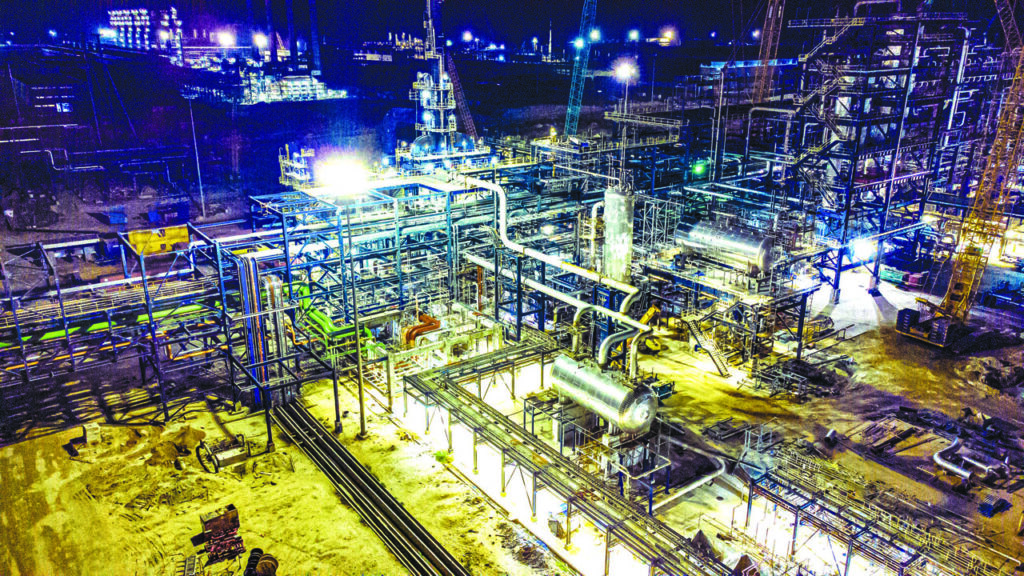
“This is a big day for Nigeria. We are delighted to have reached this significant milestone. This is an important achievement for our country as it demonstrates our ability to develop and deliver large capital projects. This is a game changer for our country.”
Days later on January 19, 2024, Dangote Petroleum Refinery commenced registration of distributors for the lifting and distribution of refined petroleum products across the country.
So far, members of three prominent associations that constitute 75 per cent of the total market in Nigeria have been registered.
The associations are: the Depot and Petroleum Products Marketers Association of Nigeria (DAPPMAN), the Independent Petroleum Marketers Association of Nigeria, (IPMAN), and Major Oil Marketers Association of Nigeria (MOMAN).
The company is also considering other marketers that have signified interest in the lifting and distribution of its petroleum products in the country.
Executive secretary, Depot, and Petroleum Products Marketers Association of Nigeria (DAPPMAN), Olufemi Adewole said, the association commenced discussions with Dangote Petroleum Refinery regarding the lifting and distribution of refined petroleum products last year during a meeting between DAPPMAN chairman, Dame Winifred Akpani, the second vice chairman, Alhaji Mahmud Tukur and the president of Dangote Group, Aliko Dangote.
According to him, the meeting was to explore collaboration between the refinery and DAPPMAN members whose nationwide presence will be critical in distributing products from the refinery to the consumers.
He said the refining of petroleum products from Dangote Refinery would accelerate Nigeria’s economic development and provide DAPPMAN members with seamless access to refined petroleum products.
The Seven Wonders of Dangote refinery? – Now, come along
Caracal Reports Nigeria presents the seven most significant strengths – or the “Seven Wonders” if you like – of the Dangote Petroleum Refinery in its revolutionary approach to the highly capital intensive African oil and gas sector.
1. Meeting Nigeria’s 100% Needs
The refinery is expected to meet 100% of all refined products required in Nigeria, and have a surplus for export. The refinery will initially produce diesel and aviation fuel and later progress to premium motor spirit.
Although it’s a 650,000 bpd facility, the refinery will start producing at 370,000 bpd, according to Devakumar Edwin, an executive at the Dangote Group. The company says the refinery can load up to 2,900 trucks a day at its truck-loading gantries.
The refinery is expected to produce 10.4 million tonnes (Mt) of gasoline, 4.6Mt of diesel, and 4Mt of aviation fuel annually.
It will also produce 0.69Mt of polypropylene, 0.24Mt of propane, 32,000t of sulphur, and 0.5Mt of carbon black per year. The products from the refinery will conform to Euro V specifications.
2. Built To Process Middle Eastern Arab Light Oil and US crudes
Though designed to process Nigerian crude, the refinery can also process most other African crude grades as well as Middle Eastern Arab Light and even US Light Tight crudes.
Of the 650,000 barrels crude refined per day when fully operational, 450,000 bpd will be dedicated to meeting Nigeria’s domestic requirement.
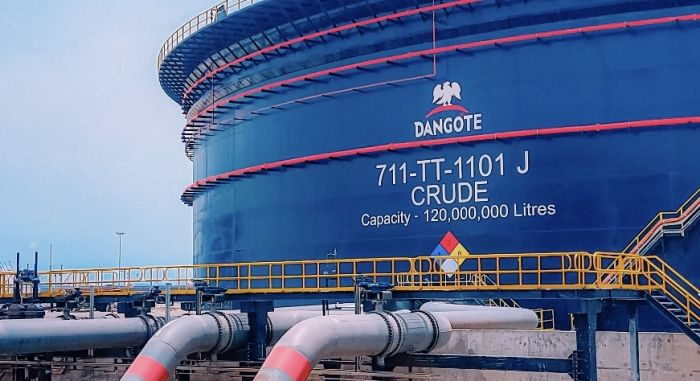
The refinery design complies with the World Bank, US EPA, European emission norms, and DPR emission/effluent norms. Analysts say the refinery will attain full operating capacity by 2025.
3. Adequately Funded By Dangote and by Nigerian apex and commercial banks
The refinery was built with the contribution of 50% equity investment by Dangote and 50% debt finance by banks.
Nigeria’s domestic banks mostly financed the commercial loan component of the project while the balance was sourced from foreign banks. The Central Bank of Nigeria (CBN) provided N125billion ($130million) to cover domestic currency requirements.
The United States Trade and Development Agency also provided a N250billion training grant for human resource development for the refinery operation.
4. Dangote Refinery To greatly increase Nigeria’s foreign exchange earnings
Nigeria’s expenditure on the importation of petroleum products tripled over a five-year period, from $8.4billion in 2017 to $23.3billion in 2022, according to the Central Bank of Nigeria.
The Bank projected that the country could spend up to $30billion annually by 2027 if it continues to rely on petroleum imports.
“Aside from the nearly $30bn foreign exchange savings from the reduction in petroleum imports, the economy is projected to benefit an extra $10bn of foreign exchange inflow through the export of refined petroleum products, which will further boost our foreign exchange reserves and enhance exchange rate stability,” former CBN governor Godwin Emefiele said at the commissioning of the refinery in May 2023.
5. Full partnerhip with the Nigerian government to balance profits
The Nigerian government through the NNPCL owns a 20% equity in the refinery valued at $2.7bn. The refinery will receive an initial 300,000 barrels of crude oil per day from the government.
In addition to holding the 20% equity in the refinery, the NNPCL has the right of first refusal to supply crude to the plant, Mele Kyari, the corporation’s chief executive officer, said in August 2022.
By right, we [also] have access to 20% of the production from that plant
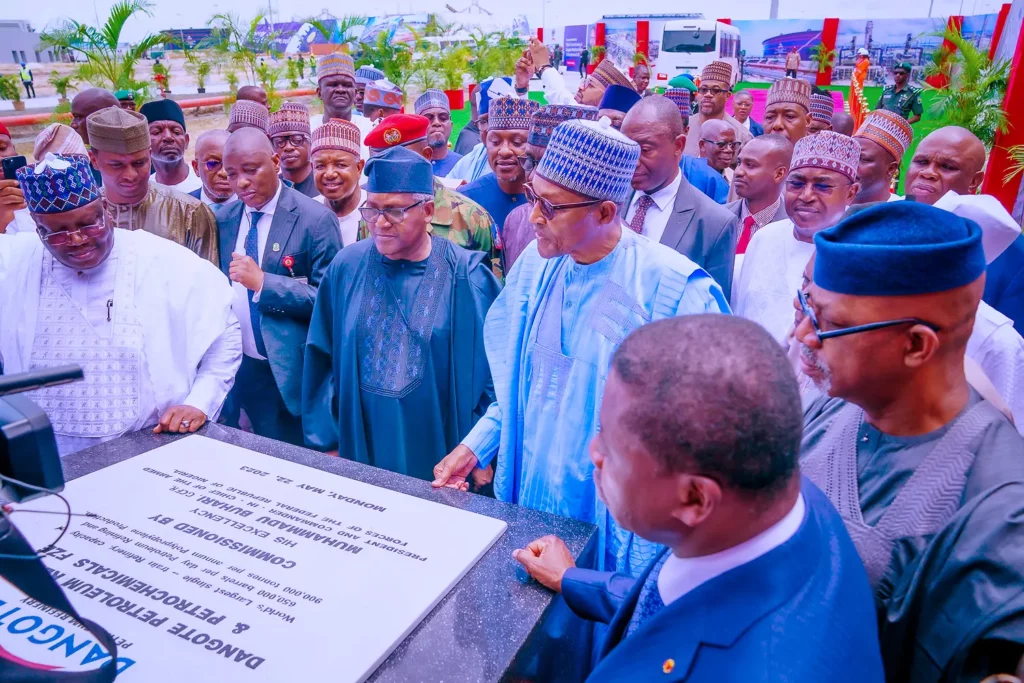
“But we saw this energy transition challenge coming, we knew that time will come when you will look for people who will buy your crude oil, you will not find,” said Kyari. “And that means we have locked down the ability to sell crude for 33,000 barrels minimum by right for the next 20 years. By right, we [also] have access to 20% of the production from that plant.”
An agreement between the two entities stipulated that the government would pay $1bn in cash, supply crude oil worth $1bn, while the $700m balance would be paid via earned dividends from the refinery’s operations.
6. Dangote refinery built from scratch
The refinery which sits on 2,635 hectares of swampland – about six times the size of Victoria Island – was from the ground up with barely existing infrastructure.
About 65 million cubic metres of sand was dredged using the world’s largest dredgers and costing approximately €300m ($326m).
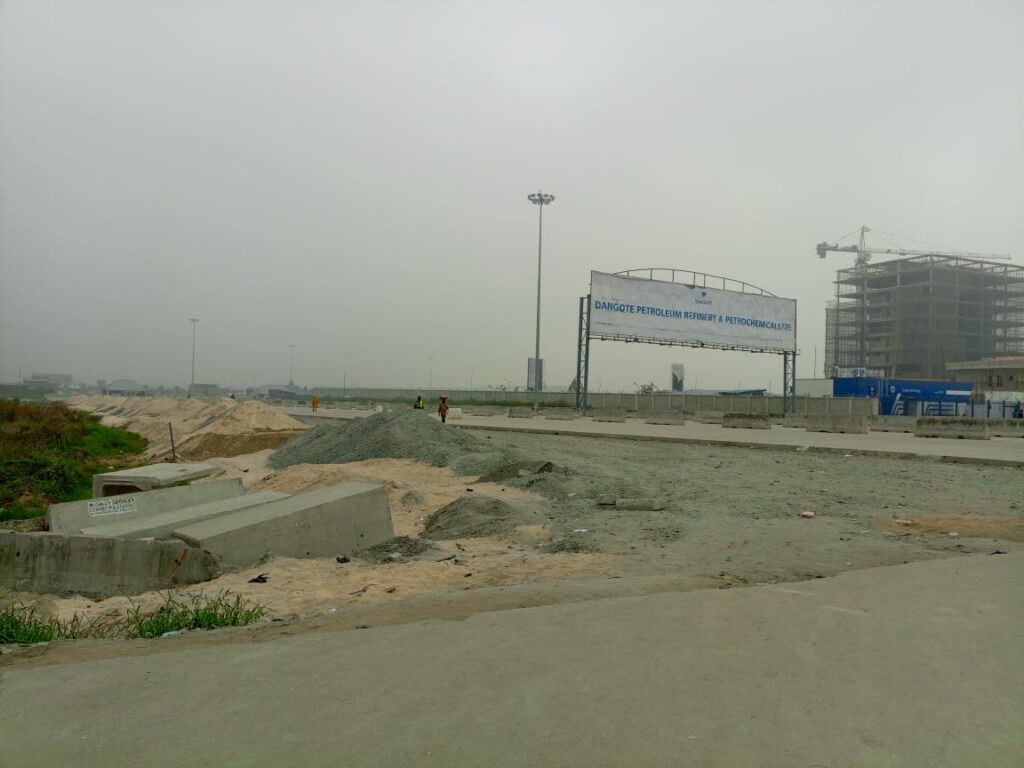
For the civil works, a total of 250,000 piles were drilled. The facility has a total of 177 tanks of 4.742 billion litres capacity.
The refinery, powered by a 435 megawatts power plant, also has the largest subsea pipeline infrastructure in the world, with a capacity to handle three billion cubic metres of oil annually.
7. Refinery brought on board more than 900 globally certified engineers
At least 900 young engineers were trained in refinery operations abroad — mechanical engineers trained in GE University in Italy and process engineers trained by Honeywell UOP for six months. Others trained at Bharat Petroleum Corporation, Mumbai in India.
At least 10 contractors were involved in various aspects of the refinery’s construction from inception to when it started operations.
Engineers India Limited handled the engineering, procurement, and construction while Honeywell UOP, a US company, supplied catalyst regeneration and dryer control systems, high-performance column trays, heat exchanger tubes, modular CCR unit, catalyst coolers among others.
C&I Leasing, a Nigerian company, provided transportation and installation services for mooring systems and subsea pipelines, while the Chinese Hangxiao Steel Structure Company provided steel structure for the refinery.
Belgian Jan De Nul Group carried out land reclamation on the 2,400 hectares.
Mammoet, a Dutch company, provided heavy lifting and transport solutions and South Korean Hyundai Heavy Industries built 15 liquefied petroleum gas tanks for the refinery.
Swiss-based Sulzer Chemtech supplied column internals, packing, and trays while MAN Diesel & Turbo, based in Germany, supplied two compressor trains.
Air Liquide Engineering & Construction, a French company, supplied the SMR units.
Fabtech (India), Schneider Electric (France), SOFEC (US), and WABAG (India) are the other suppliers involved in the refinery project.


